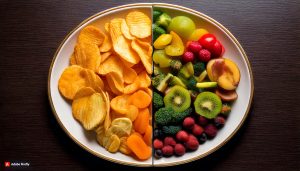PAGE CONTENT:
Understanding the Basics of Nutrition: Essential Guide to a Healthy Diet
Nutrition is the cornerstone of a healthy lifestyle. The food we consume not only fuels our bodies but also affects our overall well-being. Understanding the basics of nutrition helps us make informed choices about our diet, leading to better health outcomes. Proper nutrition involves a balance of macronutrients, micronutrients, hydration, dietary fiber, and meal planning. Each of these components plays a crucial role in maintaining bodily functions and preventing chronic diseases. This article will delve into the essential aspects of nutrition, providing a comprehensive overview to guide your dietary decisions. Whether you’re aiming to improve your health, manage weight, or enhance athletic performance, knowing the fundamentals of nutrition is key. The information presented here is based on current dietary guidelines and scientific research. By the end of this article, you will have a clearer understanding of how to nourish your body effectively. Let’s explore the vital components that make up a nutritious diet.
What are macronutrients and why are they important?
Macronutrients are nutrients required in large amounts that provide the energy necessary for bodily functions and physical activity. The three main macronutrients are proteins, carbohydrates, and fats. Proteins are essential for growth, repair, and maintenance of tissues. They are composed of amino acids, which are the building blocks of muscle, skin, and other tissues. Carbohydrates are the body’s primary energy source, fueling everything from brain function to physical exercise. They can be classified into simple carbohydrates (sugars) and complex carbohydrates (starches and fibers). Fats, while often misunderstood, are crucial for energy storage, protecting organs, and aiding in nutrient absorption. There are different types of fats, including saturated, unsaturated, and trans fats, each having different effects on health. Consuming the right balance of these macronutrients is essential for maintaining energy levels, supporting metabolic processes, and promoting overall health. Recommended daily intakes vary based on factors such as age, sex, and activity level. For example, athletes may require higher protein intake to support muscle recovery. Incorporating a variety of food sources ensures you get a balanced intake of these vital nutrients.
What are micronutrients and why are they important?
Micronutrients, though needed in smaller quantities compared to macronutrients, are vital for numerous physiological functions. These include vitamins and minerals, which support immune function, bone health, and energy production. Vitamins are organic compounds that are crucial for metabolic processes. For instance, Vitamin A supports vision and immune function, while B vitamins are important for energy metabolism. Minerals, such as calcium, potassium, and magnesium, play roles in muscle function, fluid balance, and bone health. Each vitamin and mineral has unique functions and contributes to overall health in different ways. Common sources of vitamins include fruits, vegetables, dairy products, and lean meats. Minerals can be found in foods like leafy greens, nuts, seeds, and whole grains. It’s important to consume a varied diet to ensure adequate intake of all essential micronutrients. Deficiencies in these nutrients can lead to health problems, such as weakened immunity, bone density loss, and anemia. Supplementation may be necessary in certain cases, but it’s generally best to obtain these nutrients from a balanced diet. Understanding the role of each micronutrient can help you make more informed dietary choices.
Why is drinking water so important?
Water is essential for life, playing a crucial role in maintaining bodily functions and overall health. It makes up about 60% of the human body and is involved in various physiological processes. Hydration is vital for regulating body temperature, removing waste, and lubricating joints. Water is also necessary for digestion and nutrient absorption. The recommended daily water intake varies depending on factors like age, sex, activity level, and climate. Generally, it’s suggested to drink at least eight 8-ounce glasses of water per day. However, individual needs can differ, and it’s important to listen to your body’s signals. Other sources of hydration include fruits, vegetables, and beverages like herbal teas. Dehydration can lead to symptoms such as headaches, fatigue, and impaired cognitive function. Chronic dehydration can have more serious health implications, affecting kidney function and increasing the risk of urinary tract infections. To maintain proper hydration, it’s important to drink water regularly throughout the day. Including water-rich foods in your diet can also help meet hydration needs. Monitoring urine color can be a simple way to assess hydration status—light yellow indicates proper hydration, while dark yellow suggests the need for more fluids.
What is dietary fiber and why do you need it?
Dietary fiber is a type of carbohydrate that the body cannot digest, yet it plays a crucial role in maintaining digestive health. There are two main types of fiber: soluble and insoluble. Soluble fiber dissolves in water and helps lower blood cholesterol and glucose levels. It can be found in foods like oats, beans, and apples. Insoluble fiber does not dissolve in water and helps move food through the digestive system, promoting regularity and preventing constipation. Sources include whole grains, nuts, and vegetables. The recommended daily intake of fiber is about 25 grams for women and 38 grams for men. Consuming adequate fiber has numerous health benefits, including improved digestion, weight management, and reduced risk of chronic diseases like heart disease and diabetes. High-fiber foods are often rich in other essential nutrients, making them a valuable part of a balanced diet. Incorporating a variety of fiber-rich foods ensures you get both types of fiber. Gradually increasing fiber intake and drinking plenty of water can help prevent digestive discomfort. Understanding the role of dietary fiber can enhance your overall nutritional strategy and support long-term health.
How do I create a healthy diet?
Creating a balanced diet involves incorporating a variety of foods to meet your nutritional needs. The key is to include the right proportions of macronutrients and micronutrients while considering portion sizes. A balanced diet provides the necessary energy and nutrients to support overall health and well-being. Start by filling half your plate with fruits and vegetables, which are rich in vitamins, minerals, and fiber. Include lean proteins such as fish, poultry, beans, and nuts to support muscle repair and growth. Whole grains like brown rice, quinoa, and whole wheat bread provide sustained energy and additional fiber. Healthy fats, found in avocados, nuts, and olive oil, should be consumed in moderation to support heart health. Planning and preparing meals in advance can help you maintain a balanced diet. It’s also important to be mindful of portion sizes to avoid overeating. Eating a variety of foods ensures you get a wide range of nutrients, reducing the risk of deficiencies. Listening to your body’s hunger and fullness cues can guide your eating habits. A balanced diet not only supports physical health but also contributes to mental and emotional well-being.
SUMMARY
Understanding the basics of nutrition is fundamental to achieving and maintaining good health. Macronutrients, including proteins, carbohydrates, and fats, provide the energy and structural components necessary for bodily functions. Micronutrients, such as vitamins and minerals, support a range of physiological processes and prevent deficiencies. Hydration is critical for maintaining various bodily functions and overall health. Dietary fiber plays a key role in digestive health and disease prevention. Creating a balanced diet that includes a variety of nutrient-dense foods ensures you meet your nutritional needs. By incorporating these principles into your daily life, you can enhance your overall well-being and prevent chronic diseases. Remember, good nutrition is a continuous journey that requires awareness and commitment.















